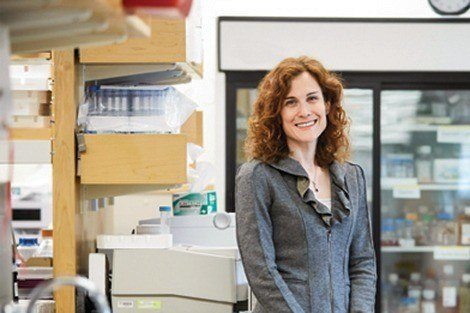[ Fall 2014 ]
Wendy Garrett, Associate Professor of Immunology and Infectious Diseases
Wendy Garrett specializes in studying the human gut— the part of our anatomy that carries the greatest number of microbes—and the possible links between these hordes of bacteria and colon cancer.
“I’m fascinated by the fact that we are a multispecies self. That sounds kind of highfalutin, but what it means is that we as humans need to have a larger view of ourselves as a life-form. We have our human self. We also have a microbial self. We harbor other kingdoms of life, including single-celled organisms in the two scientific domains formally known as Bacteria and Archaea. And we have viruses and parasites that live within us and within our bacteria. If we counted up all our microbial cells, they would outnumber our human cells 10 to one.
The intestinal tract is a very complicated place in the body. The colon is actually the most densely populated bacterial ecosystem on the planet. You have a single lining of human epithelial cells and this rich network of immune cells. And both the immune system and the epithelium have a tricky task: They have to parse which microbes are symbiotic—they live as a part of us—and which are threats and make us sick.
In cancer research, there’s a big push to think about the unique relationship that cancers have with the immune system. This is especially relevant to colon cancer, which harbors bacteria. At times, these tumors have the ability to evade recognition, detection, and immune response. They also trigger certain kinds of inflammation that promote the growth and spread of the cancer. What’s intriguing is that microbes do the same exact thing. They evade the immune system, they trigger special kinds of inflammation that provide them with a selective advantage. And like cancer, bacteria have the ability to mutate their own genes—they are genetically very unstable. What this means is that if we learn about how microbes work, it could complement our understanding of how cancers evolve, develop, and spread.”
Photo: Kent Dayton / HSPH
Download a PDF of Off the cuff: What can microbes teach us about cancer?
